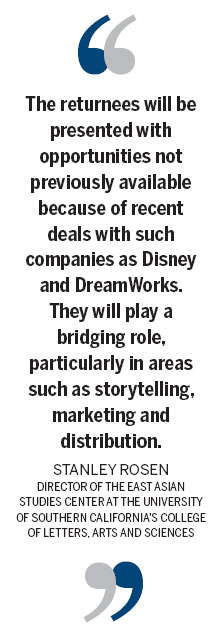Hints From Hollywood
Updated: 2012-04-27 10:37
By Zhou Liming (China Daily)
|
|||||||||||
A secret plan
Zhang Lihui recently left Warner Bros after 17 years, "all in corporate positions". She has a secret plan for getting into the production side of the business, a field in which she has a master's degree (plus a doctorate in film theory). "I want to do something that takes my fancy while I still have the energy."
In addition to consultancy work for a number of US companies, Zhang is shuttling back and forth across the Pacific Ocean to facilitate a co-production, which originated in the US and is now incorporating the feedback from the Chinese side. "American audiences are receptive to this kind of story, but China is at a phase where people are not ready for serious drama. They want more action," she said.
What China can learn from Hollywood, according to Zhang, is increased protection of intellectual property and greater development of the ancillary market that includes television rights and disc sales. "Chinese players tend to go to extremes when pricing and selling their products."
 |
Some of the Chinese films that have garnered respectable overseas box office proceeds have been co-productions, such as Karate Kid II and The Forbidden Kingdom. David U. Lee, who advised China Film Group on the Karate Kid sequel and served as co-executive producer of The Weinstein Company's Asian Film Fund Production, Shanghai, said that co-productions are harder to do because one has to think from both perspectives and some "core commercial elements" have to be compromised. A lot of the things a filmmaker takes for granted can suddenly become sensitive when examined through the eyes of another culture.
According to Lee and Ji, there is a glut of scripts floating around with cross-cultural subject matter, such as the Flying Tigers (volunteer pilots from the US who joined the Chinese air force during World War II) or the story of Jewish immigrants in Shanghai. "It has become such a cliche," said Ji. "While there is no formula for what will work, the successful ones always come back to universal values, as in Slumdog Millionaire. But even films like that should not be expected to compete with mainstream Hollywood fare."
Lee said that things have changed in recent years. It has become clearer that pure drama does not transcend cultures as easily as action films. "It's hard enough to make movies with no restrictions, but once you factor in cultural compromises it becomes harder to sell them internationally."
As for the overseas reception for Chinese films, Lee argued that a story set in ancient times is likely to be more easily embraced by an overseas audience than one with a contemporary setting. Likewise, a rural story is easier on a foreign audience than an urban one. "If it's a contemporary drama or comedy, the Hollywood version can usually go around the world because it is big enough. Each country will then have its own version of the same story, but it will be limited to the local market."
That means martial arts movies may remain Chinese cinema's highest-profile productions internationally. When asked whether Asians will feature as superheroes in future blockbusters, Lee was cautiously optimistic: "I think it'll be an Asian film and then Hollywood will follow suit. Also, it'll be a star that makes it big in Asia first. Then Hollywood will say 'Come over'."
Lee's "next big frontier" is to "work with Chinese enterprises to acquire US studios". He considers it his "ultimate show business plan", and one that will utilize all the skills he's accumulated in the US and China.
What a Hollywood studio has that no one else can come close to matching, explained Lee, is its global distribution capability. "They control their own destiny." Lee senses that, in China, he has greater control over his own destiny too.
Yang Wanli contributed to this story.
raymondzhou@chinadaily.com.cn
Today's Top News
Rescuers race against time for quake victims
Telecom workers restore links
Coal mine blast kills 18 in Jilin
Intl scholarship puts China on the map
More bird flu patients discharged
Gold loses sheen, but still a safe bet
US 'turns blind eye to human rights'
Telecom workers restore links
Hot Topics
Lunar probe , China growth forecasts, Emission rules get tougher, China seen through 'colored lens', International board,
Editor's Picks

|

|

|

|

|

|





